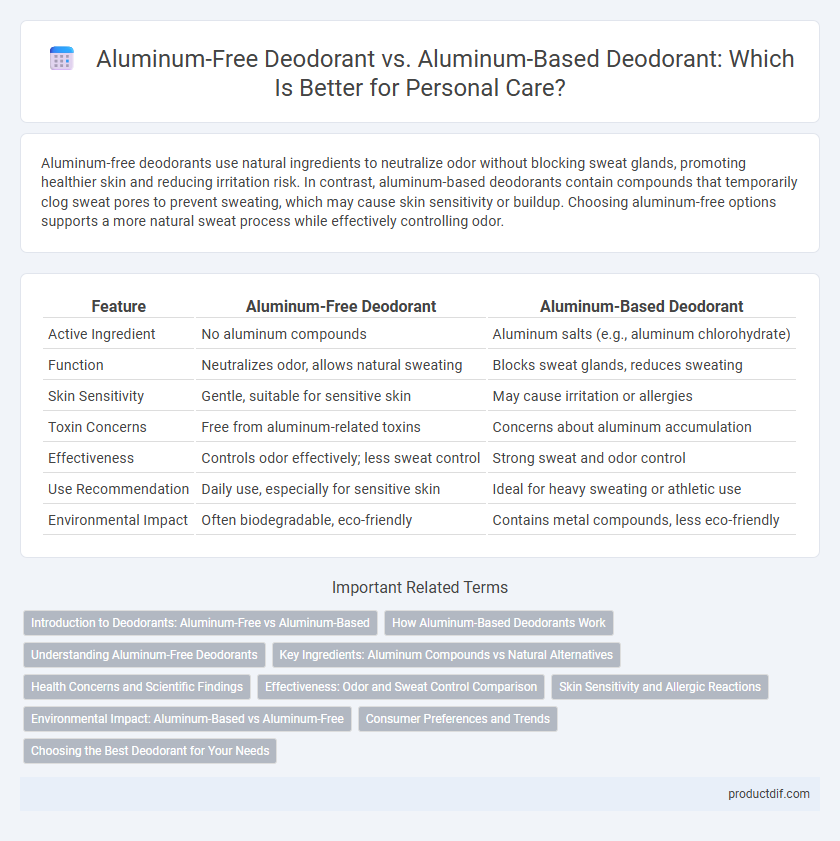Aluminum-free deodorants use natural ingredients to neutralize odor without blocking sweat glands, promoting healthier skin and reducing irritation risk. In contrast, aluminum-based deodorants contain compounds that temporarily clog sweat pores to prevent sweating, which may cause skin sensitivity or buildup. Choosing aluminum-free options supports a more natural sweat process while effectively controlling odor.
Table of Comparison
| Feature | Aluminum-Free Deodorant | Aluminum-Based Deodorant |
|---|---|---|
| Active Ingredient | No aluminum compounds | Aluminum salts (e.g., aluminum chlorohydrate) |
| Function | Neutralizes odor, allows natural sweating | Blocks sweat glands, reduces sweating |
| Skin Sensitivity | Gentle, suitable for sensitive skin | May cause irritation or allergies |
| Toxin Concerns | Free from aluminum-related toxins | Concerns about aluminum accumulation |
| Effectiveness | Controls odor effectively; less sweat control | Strong sweat and odor control |
| Use Recommendation | Daily use, especially for sensitive skin | Ideal for heavy sweating or athletic use |
| Environmental Impact | Often biodegradable, eco-friendly | Contains metal compounds, less eco-friendly |
Introduction to Deodorants: Aluminum-Free vs Aluminum-Based
Aluminum-free deodorants use natural ingredients to neutralize odor without blocking sweat glands, appealing to those seeking a chemical-free option. Aluminum-based deodorants contain aluminum compounds that temporarily block sweat pores, reducing perspiration and odor. Choosing between them depends on personal health concerns and preferences for sweat control or ingredient transparency.
How Aluminum-Based Deodorants Work
Aluminum-based deodorants work by temporarily blocking sweat ducts with aluminum salts, reducing perspiration and preventing odor-causing bacteria from thriving. These compounds create a gel-like barrier on the skin's surface, minimizing the amount of sweat released during daily activities. This mechanism effectively controls wetness and odor but has raised concerns about potential skin irritation and health effects, prompting some consumers to choose aluminum-free alternatives.
Understanding Aluminum-Free Deodorants
Aluminum-free deodorants rely on natural ingredients like baking soda, witch hazel, or activated charcoal to neutralize odor without blocking sweat glands. Unlike aluminum-based deodorants that use aluminum compounds to temporarily seal sweat ducts, aluminum-free options allow natural perspiration while controlling bacteria. Many users prefer aluminum-free deodorants for their gentler formula, reducing skin irritation and concerns over potential health risks linked to aluminum exposure.
Key Ingredients: Aluminum Compounds vs Natural Alternatives
Aluminum-based deodorants rely on aluminum compounds such as aluminum chlorohydrate and aluminum zirconium tetrachlorohydrex gly to temporarily block sweat glands and reduce perspiration. In contrast, aluminum-free deodorants use natural alternatives like baking soda, arrowroot powder, coconut oil, and shea butter to absorb moisture and neutralize odor without clogging pores. These natural ingredients support skin health by minimizing irritation and allowing the skin to breathe, making aluminum-free options preferred for sensitive skin types.
Health Concerns and Scientific Findings
Aluminum-free deodorants avoid aluminum compounds, which have been studied for potential links to skin irritation and concerns about breast cancer and Alzheimer's disease, although conclusive scientific evidence remains limited. Aluminum-based deodorants use aluminum salts to block sweat glands, effectively reducing perspiration but raising debates over long-term safety and possible toxin buildup. Research highlights the importance of individual sensitivity and the need for further studies to clarify the health implications of aluminum exposure in personal care products.
Effectiveness: Odor and Sweat Control Comparison
Aluminum-free deodorants use natural ingredients like baking soda and botanical extracts to neutralize odor but may provide less reliable sweat reduction compared to aluminum-based deodorants, which block sweat glands through active aluminum compounds. Studies show aluminum-based products generally offer superior effectiveness in preventing underarm wetness, making them preferred for high-intensity activities. However, aluminum-free options are favored by those seeking a chemical-free alternative while maintaining reasonable odor control.
Skin Sensitivity and Allergic Reactions
Aluminum-free deodorants are often preferred by individuals with sensitive skin because they reduce the risk of irritation and allergic reactions commonly associated with aluminum-based deodorants. Aluminum compounds in traditional deodorants can clog pores and cause redness, itching, or rashes in sensitive skin. Choosing aluminum-free formulas helps maintain healthy skin balance by avoiding these common allergens and irritants.
Environmental Impact: Aluminum-Based vs Aluminum-Free
Aluminum-based deodorants contribute to environmental degradation through the mining and refining of bauxite, which generates toxic waste and greenhouse gas emissions. Aluminum-free deodorants often utilize natural, biodegradable ingredients that reduce ecological footprint and minimize pollution. Choosing aluminum-free options supports sustainable production practices and decreases reliance on energy-intensive aluminum extraction.
Consumer Preferences and Trends
Consumer preferences in personal care increasingly favor aluminum-free deodorants due to concerns over potential health risks linked to aluminum compounds in traditional deodorants. Market trends reveal a significant rise in demand for natural and organic ingredients, with aluminum-free options appealing to health-conscious and environmentally aware consumers. Sales data indicates a robust growth rate in aluminum-free deodorants, reflecting shifting priorities toward safer, non-toxic personal care products.
Choosing the Best Deodorant for Your Needs
Aluminum-free deodorants are ideal for individuals seeking natural alternatives that reduce skin irritation and avoid blocking sweat glands, promoting healthier skin. Aluminum-based deodorants provide longer-lasting odor protection by temporarily sealing sweat pores, making them suitable for high-intensity activities or heavy perspiration. Selecting the best deodorant depends on personal preferences regarding skin sensitivity, lifestyle, and desired odor control effectiveness.
aluminum-free deodorant vs aluminum-based deodorant Infographic

 productdif.com
productdif.com